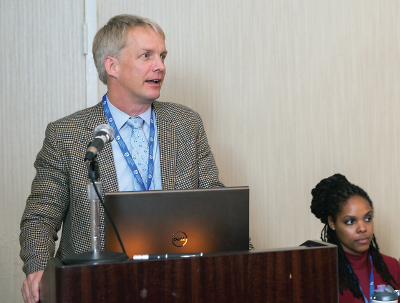Recovery After Disaster Involves Reaching Out—and Reaching In
Abstract
Panelists discuss how psychiatrists can facilitate an effective disaster response while protecting themselves.
Mental health services are critically needed in the aftermath of a disaster, whether natural or manmade; in addition to rebuilding homes and communities, people impacted by disaster need to rebuild their psyches.

New Orleans native Benjamin Springgate, M.D., M.P.H., discusses how working with community partners to implement a collaborative care program can promote effective disaster response, as REACH NOLA did after Hurricane Katrina.
Yet the nature of disasters leads to a frustrating situation, said Benjamin Springgate, M.D., M.P.H., an associate professor at Louisiana State University (LSU) School of Medicine. He was part of a panel discussion on disaster recovery at IPS: The Mental Health Services Conference, held in New Orleans in October.
“The basic notion of a disaster is that it overwhelms all existing resources,” he said. For mental health, this is especially problematic as most communities do not have enough mental health resources even before a disaster hits.
As a New Orleans native with firsthand disaster experience, however, Springgate attested that these obstacles can be overcome in even the most damaged and depleted communities. In the wake of Hurricane Katrina in 2005, Springgate and some of his colleagues developed a collaborative care–based program known as REACH NOLA that worked with numerous stakeholders such as health clinics and faith-based organizations to train people to deliver cognitive-behavioral therapy to affected residents and build community resilience.
One important point stressed throughout the session was that psychiatrists don’t have to do all the outreach and engagement alone. For example, Ashley Wennerstorm, Ph.D., M.P.H., an assistant professor of medicine at Tulane University, discussed the role of community health workers (CHWs) who serve as key liaisons between underserved communities and health care systems. CHWs facilitate access between these two groups and help communities capacity building through social support, education, and coaching.
While CHWs have been used for years to assist with physical health problems like diabetes, they have a limited role in assisting with mental health care. About three years after Katrina hit New Orleans, Wennerstorm launched a program to train CHWs to support depression care as a part of a collaborative care model. That program included teaching CHWs how to screen for depression and refer people to either primary care providers or mental health specialists.
Wennerstorm noted that the program has been a great success, and several of the trained CHWs are still closely involved in mental health care.
Sheila Savannah, director of the nonprofit Prevention Institute, said that a key to successful recovery is not to think of a disaster-affected community as just an aggregation of people. To be truly effective, recovery programs need to improve the people, the physical place, and future opportunities.
Savannah said that communitywide programs such as group art projects or educational classes are an effective way to help communities heal; they help individuals restore social connections, strengthen life skills, and express some of their emotions. Moreover, the participation of psychiatrists in such activities can help engender trust within the community. As session moderator Glenda Wrenn, M.D., an associate professor of psychiatry at Morehouse School of Medicine, stated, “People want to see you in their community as a human being.”
Understanding that health care professionals are also human raises another important question: How do community experts provide mental health care if they are trying to recover themselves?
That topic was addressed in another IPS session titled “It’s My Trauma, Too,” led by Eva Matthews, M.D., M.P.H., an assistant clinical professor of psychiatry at LSU Health in Baton Rouge. Matthews noted how her community had been struck with a rapid succession of disastrous events in the summer of 2016: the shooting of Alton Sterling by police, the killing of three Baton Rouge police officers, and catastrophic flooding.
Such a chain of events makes psychiatrists vulnerable to mental distress, while also raising the risk of compassion fatigue, a form of burnout in which psychiatrists experience mental exhaustion from seemingly nonstop caregiving.
One way to counteract this risk of depression and fatigue is through group debriefing sessions, Matthews said. These sessions, which should be held shortly after a traumatic event, allow the members of a psychiatry team (such as the staff at a small clinic or all the residents at an academic department) to share their feelings, fears, and frustrations and build resilience. Follow-up debriefings focus on identifying fatigue and providing additional emotional support.
Two LSU psychiatry residents—Deonna Dodd, M.D., and Shanique Ampiah, M.D., shared their experiences during the debriefing program in which they participated following the 2016 Baton Rouge shootings. They agreed that the open, honest, and frank “no-holds-barred” discussion was cathartic.
“It really brought us closer together as a cohort in this shared experience called a residency,” Ampiah said. ■
More information on REACH NOLA can be found in “Building Community Resilience Through Mental Health Infrastructure and Training in Post-Katrina New Orleans”.



